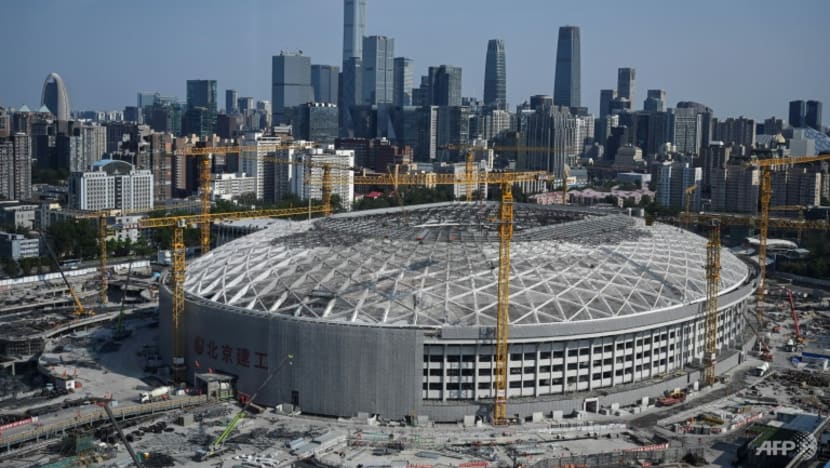
BEIJING: Gleaming football stadiums constructed for the Asian Cup might flip into “white elephants” after China withdrew as hosts, specialists say, with President Xi Jinping’s World Cup desires extra distant than ever.
Ten cities throughout China have sunk billions of {dollars} to construct eight new stadiums and renovate two others for the Asian Cup subsequent summer time.
But with the nation sticking to its inflexible zero-COVID coverage and its largest metropolis, Shanghai, solely simply now tentatively rising from a weeks-long lockdown, China pulled out of staging the competitors final weekend.
“The Asian Cup was simply the prelude to a men’s World Cup bid,” Simon Chadwick, director of the Centre for the Eurasian Sport Industry at Emlyon Business School, mentioned.
“But China’s football ambitions appear to be in tatters.”
Billboards proudly asserting the Asian Cup can nonetheless be seen across the Workers’ Stadium within the coronary heart of Beijing.
The historic stadium was torn down and is being rebuilt, the drastic revamp costing taxpayers US$484 million, per official knowledge.
“With or without the Asian Cup we plan to finish the stadium as planned,” a building employee mentioned.
Quite when football of any description takes place there may be unclear.
The Chinese Super League is ready to begin the brand new season and when it does seems to be sure to happen at closed impartial venues as a result of of COVID-19.
On the pitch, the nationwide aspect once more failed to achieve this 12 months’s World Cup and there was an exodus of prime international gamers and coaches in current seasons.
‘WHITE ELEPHANTS’?
China has turned to big-ticket infrastructure initiatives to juice up its pandemic-stricken economic system, the world’s second-largest, and officers say that constructing glitzy football stadiums was half of that plan.
Some, just like the futuristic 60,000-seater Egret Stadium within the coastal metropolis of Xiamen, are bobbing up in cities which would not have a top-tier group to name the venue dwelling.
And even when crowds are allowed again into stadiums – which seems to be a great distance off – CSL groups will wrestle to muster sufficient followers to fill most of them.
“The ones in relatively smaller cities like Xiamen or in cities where there are (existing) stadiums like Xi’an … are more liable to be white elephants,” Beijing-based sports activities marketing consultant William Bi mentioned.
“As the economy is backsliding there is little chance for splashing money to build a club that deserves a giant stadium.”
Developers have added amenities that may enable the brand new stadiums to double up as live performance venues, but China’s strict COVID-19 restrictions have killed the live-entertainment trade together with the football.
China is already struggling to reuse different main sporting venues constructed lately, Chadwick mentioned.
“When resources are scarce this is an incredibly wasteful and sub-optimal way of planning,” he mentioned.
About a dozen of the 18 groups alleged to be taking part in within the CSL this 12 months are backed by actual property firms.
But a cooling economic system has left many builders scrambling to repay loans.
The native authorities took away a US$1.86 billion stadium building challenge from floundering developer Evergrande, which owns former Asian champions Guangzhou FC, Chinese media group Caixin reported in March.
The Guangzhou Evergrande stadium was initially deliberate to have a capability of 100,000 and a hanging lotus flower-shaped design, though the tip product will see the daring concept considerably scaled again.
“Investment in football was politically expedient on the part of developers as it helped cultivate strong relationships with the state,” Chadwick mentioned.
“What this recent turbulent period appears to have done … is to cut the cord between football and property development, raising questions about the future of Chinese football.”
DAMAGED REPUTATION?
Football-fan president Xi’s desires of turning the nation into a powerhouse of the game succesful of staging and even profitable a males’s World Cup have light markedly over the previous couple of years.
The nation’s ambitions to be a world sporting hub have additionally been crushed, at the very least within the brief time period, by its hardline COVID-19 technique.
With the exception of this 12 months’s Winter Olympics, held in a virus-secure Beijing “bubble” in February, China has cancelled or postponed virtually all worldwide sports activities occasions since COVID-19 emerged in Wuhan in late 2019.
The Asian Games, attributable to be staged in September in Hangzhou, had been postponed earlier this month. It is unclear when China will host an expanded football Club World Cup – it was alleged to be final 12 months.
“China’s reputation as a reliable sporting event host has been damaged,” the sports activities marketing consultant Bi mentioned.
Xi’s grasp plan to remodel football on and off the pitch has now been relegated to the again burner amid financial woes, Bo Li, professor of sports activities administration at Miami University, mentioned.
“Hosting a World Cup is not the current leader’s top priority (anymore),” he added.

Source : channelnewsasia.com


0 Comments